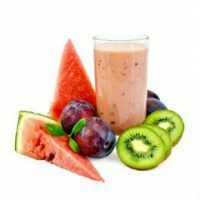
The circulatory system and blood quality significantly affect the work of the entire human body. Blood transports to all organs and tissues oxygen and necessary substances. To qualitatively perform this function, the blood should not be too thick and viscous. Solve the problem of thickened blood in addition to drugs are capable of products that dilute blood.
- Causes of blood thickening
- The main products of
- In pregnancy
- With thrombophlebitis
Causes of blood thickening
The following factors can cause a thickening of blood:
- Excessive consumption of sugar and carbohydrates.
- Elevated blood hemoglobin.
- Elevated blood levels of red blood cells and platelets.
- Hereditary or acquired increased blood coagulability.
- Insufficient level of production of pancreatic enzymes.
- Incorrect liver function.
- Deficiency in the body of substances that are necessary for the production of hormones and enzymes( vitamin C, lecithin, selenium, zinc).
- Dehydration of the body due to insufficient water intake, with prolonged diarrhea or vomiting.
- Long-term use of medicines containing valerian and motherwort.
- Products that thicken the blood: alcoholic and carbonated drinks, bananas and potatoes, fatty and sweet foods, smoked products, buckwheat, beans, peas and soy, rose hips.
The main products of
For the dilution of blood, medicines( for example, aspirin) are not always used, in most casescases to solve the problem is proper nutrition:
- to exclude from the diet sweet and fried foods, smoked and salted foods, foods with a high content of starch;
- food should be cooked boiled or stewed;
- it is necessary to drink at least 1.5-2 liters of water a day, without taking into account soups, compotes and other beverages;
- to reduce or eliminate the use of diuretics, for example, coffee, strong tea, alcohol;
- include in the diet more products that dilute blood.
However, their use is undesirable to combine with the use of medicinal anticoagulants without a doctor's prescription.
The list of products that dilute the blood includes:
- Herbs and spices: ginger, cayenne pepper, curry, cinnamon, turmeric, mint, oregano, paprika, thyme.
- Vegetables and spices: eggplant, Bulgarian red pepper, zucchini, onion, cucumber, tomato, beetroot, dill, garlic.
- Fruits and berries: apricot, orange, cowberry, grapes, cherry, pomegranate, grapefruit, blackberries, strawberries, figs, cranberries, lemon, raspberries, mandarin, buckthorn, plum, blueberries.
- Dried fruits: raisins, dried apricots, prunes.
- Fish with a high content of omega-3-acids: anchovies, salmon, herring, mackerel, tuna.
- Seafood and seaweed.
- Sour-milk products.
- Alcoholic and other liquids: birch sap, wine, green tea without sugar, cider, vinegar.
- Vegetable oil of cold pressing: olive, linen, rapeseed.
- Med.
During pregnancy,
The difficulty is that improving the functioning of the circulatory system by increasing the amount of water consumed is not recommended because of possible puffiness. It is also undesirable to take anticoagulant preparations.
The best solution is to increase in the diet of a pregnant woman foods high in salicylates, of course, on the advice of a doctor, taking into account possible allergic reactions or harmful effects on the child. These include:
- tomatoes;
- onion;
- Bulgarian pepper;
- various berries and fruits,;
- dried fruits;
- oily fish;
- cold pressed vegetable oil.
Freshly squeezed juices from fruits and vegetables of red color are very useful for pregnant women, in which you can add dill or mint. In the warm season it is good to include vegetable stews in the daily diet.
With thrombophlebitis
It is very important to observe a special diet for diseases such as thrombophlebitis and varicose veins.
The latter, in addition to the previously listed products, include pineapples, watermelons and melons.
